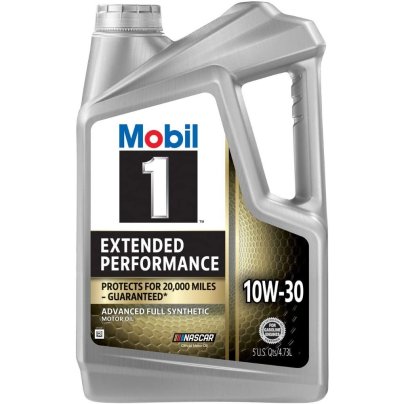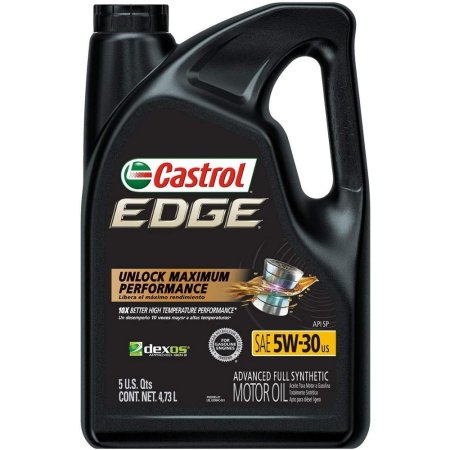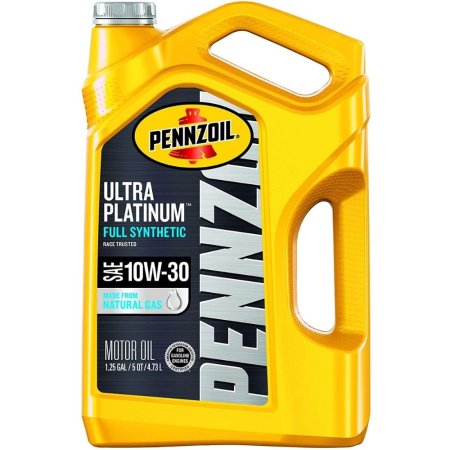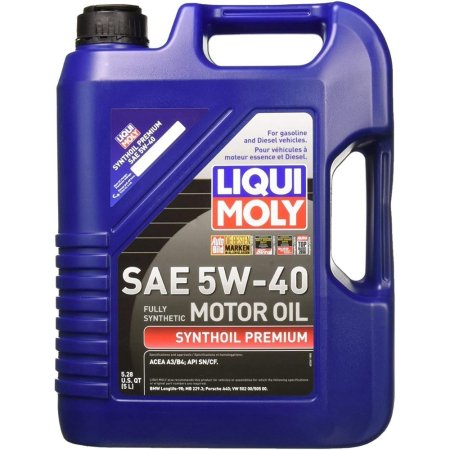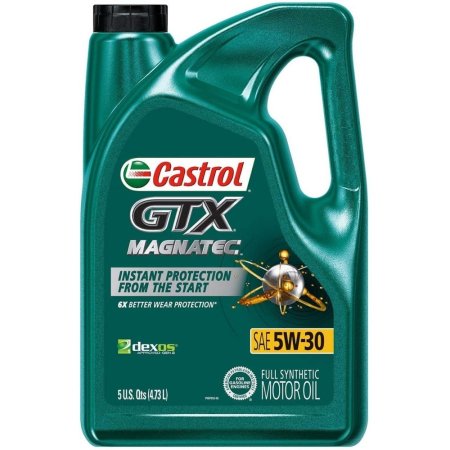
We may earn revenue from the products available on this page and participate in affiliate programs. Learn More ›
An engine will seize up within minutes of running with no motor oil, so it’s not difficult to understand how vital a high-quality motor oil is to an engine, be it a car or a lawn mower. And, nothing protects an engine better than synthetic motor oil. These motor oils are specially formulated in a laboratory to help engines operate at peak performance, extending their life and improving gas mileage. Synthetic oils have fewer impurities than conventional motor oils and include additives that provide optimal lubrication while also cleaning sludge and deposits from the engine.
This guide will explore which characteristics are crucial to consider when shopping for the best synthetic motor oil and review some of the top-rated products on the market.
- BEST OVERALL: Castrol 03084C Edge 5W-30 Advanced Full Synthetic
- RUNNER-UP: Pennzoil – 550045192 Ultra Platinum Full Synthetic
- BEST BANG FOR THE BUCK: Mobil 1 Extended Performance Full Synthetic Motor Oil
- BEST HIGH-PERFORMANCE: Royal Purple 51530 High Performance Motor Oil 5W-30
- BEST FOR ENGINE LIFE: Liqui Moly 2041 Premium 5W-40 Synthetic Motor Oil
- BEST COLD WEATHER: Castrol 03057 GTX MAGNATEC 5W-30 Full Synthetic

What to Consider When Choosing the Best Synthetic Oil
While synthetic motor oil has a clear edge over traditional motor oil, not all synthetic oils are created equal. Ahead, learn how additives, viscosity, and other factors determine the overall performance of synthetic motor oil.
Full Synthetic vs. Synthetic Blend
Synthetic motor oil is available in two options: full synthetic and synthetic blend. True to its name, full synthetic oil is created entirely in a lab to remove impurities that are present in conventional motor oil. In addition to a lack of impurities, full synthetic oil features additives that help to improve engine performance. These additives include chemicals that improve the oil’s lubrication ability and detergents that clean deposits and sludge as the oil circulates through the engine.
Synthetic blend motor oil uses a mixture of conventional oil and synthetic oil. Like full synthetic, a synthetic blend includes additives that help to improve engine performance by preventing the buildup of harmful impurities while also improving the lubrication qualities of the oil. The difference is that synthetic blends do not offer the same high-quality engine performance as full synthetic oils.
Additionally, a full synthetic oil is significantly more expensive than a synthetic blend, sometimes costing several times as much.
Viscosity Rating
Viscosity refers to the thickness of a motor oil. Generally speaking, the thicker the oil, the better able it is to lubricate and protect an engine from the harmful effects of friction, especially in hot weather.
That said, thicker oils also have a harder time circulating through an engine when it’s cold, making it more difficult to start in cold temperatures and also causing more wear on the engine. For this reason, oils have different viscosity ratings to suit different types of vehicles and environments.
An oil’s viscosity rating, also referred to as its “weight,” is the large two-number code on the front of the oil container. Some of the most common viscosity ratings are 10W-30, 10W-40, and 5W-20. Each number in an oil’s viscosity rating indicates its ability to function at extreme temperatures.
The first number delineates how well a motor oil performs in cold temperatures, followed by the “W,” which stands for “winter.” For this low-temperature rating, oils are tested at 0 degrees Fahrenheit. Those that remain thinner at 0 degrees receive a lower number, while those that become thicker have a higher number. With that in mind, 5W-30 motor oil is thinner, and therefore better suited for extreme cold than 10W-30 motor oil.
Motor oil is tested at 212 degrees Fahrenheit to determine its hot-weather rating, which is the second number. In this case, the higher the number the better. Thus, 10W-40 motor oil will stay more viscous and better protect the engine in extreme heat than 10W-30 motor oil.
Climate
An excellent benefit of synthetic oils is that they flow better in the winter and protect better in the summer than traditional motor oils. However, it’s still important to consider the climate when choosing the appropriate weight for synthetic motor oil.
With much of a motor oil’s performance dependent on temperature, understanding the weight that works best for certain temperatures is key to choosing the right oil. Someone living in parts of Arizona where temperatures routinely exceed 100 degrees Fahrenheit might select a 20W-50 motor oil, while someone living in northern Canada may opt for 0W-20. For people who live in less extreme climates, where it’s typically hot in the summertime and cold in the wintertime, 5W-30 motor oil is ideal.
Additives
One of the biggest advantages of synthetic motor oils is that they include additives that help improve engine performance. Additives include chemicals that improve lubricity, ensuring the engine doesn’t become too hot in extreme temperatures. Detergents help keep the engine clean by scrubbing away sludge and deposits that can limit an engine’s performance over time.
These additives often ensure that synthetic oils hold up better than traditional motor oils, extending the time between oil changes from 3,000 miles for traditional motor oil to up to 10,000 miles for synthetic oil or even 25,000 miles for high-end synthetic oil.
Our Top Picks
These top picks take into account the abovementioned considerations, in addition to overall quality and price, to trim the field of available products to some of the best synthetic oils on the market. Any of these products will help an engine run at peak performance while extending its life.
Best Overall
Castrol 03084C Edge 5W-30 Advanced Full Synthetic
At the heart of Castrol’s top-tier synthetic oil, Castrol Edge, is its patented titanium technology. This technology causes the molecular structure of the oil to change when under pressure, creating a cushion between the engine’s surfaces that reduces friction created between its moving parts by up to 20 percent. This gives Castrol Edge the literal edge over the rest of the competition by being three times as effective at resisting viscosity breakdown in the engine as other full synthetics.
Castrol Edge also includes detergents that combat sludge while preventing deposits from building up in the engine. In addition to this 5W-30 weight in a 5-quart container, the synthetic oil is also available in 5W-20, 5W-40, and 5W-50.
Runner-Up
Pennzoil – 550045192 Ultra Platinum Full Synthetic
Pennzoil’s unique refining technology that turns natural gas into a full synthetic motor oil makes this one of the top-rated oils on the market. This is because the process creates a base oil that is 99.5 percent pure. As a result, this 5-quart container of Pennzoil Ultra Premium motor oil has fewer impurities that can leave harmful deposits in an engine than other synthetics, ensuring it is 25 to 35 percent cleaner.
The improved engine performance means significantly better fuel economy than other motor oils. Engines using this 10W-30 oil will gain an average of 550 more miles per year on the same amount of gas versus a vehicle with a dirtier engine. This synthetic oil comes in 0W-20, 0W-40, 5W-20, and 5W-30 weights in 1-quart and 5-quart containers.
Best Bang for the Buck
Mobil 1 Extended Performance Full Synthetic Motor Oil
Most full synthetic motor oils are a significant leap in price over traditional motor oils. Mobil 1 is an exception. At a price that’s not much different from traditional motor oils—especially when purchased in this large 5-quart container—it’s hard to justify not using synthetic motor oil.
This Extended Performance 10W-30 formula includes detergents to help prevent deposits and sludge from collecting in the engine parts. It also offers excellent protection in extreme temperatures, retaining optimal viscosity in wide-ranging temperatures as cold as -20 degrees Fahrenheit and as hot as 500 degrees Fahrenheit. These qualities also mean the oil holds up for a longer period of time, protecting the engine for up to 20,000 miles. This synthetic oil is also available in 0W-20, 5W-20, and 5W-30, each in a 5-quart container.
Best High-Performance
Royal Purple 51530 High Performance Motor Oil 5W-30
Royal Purple’s formula is designed for hard driving at high speeds when the engine is pushed to its limit. This oil’s special sauce is Synerlec, which bonds with the metal parts in the engine to improvise its viscosity and lubrication ability while the engine is operating under stress at extreme temperatures. This makes Royal Purple 5W-30 the optimal choice for those who like to push their car to the limit.
Like other synthetics, this oil will provide a noticeable improvement in fuel efficiency while eventually extending the mileage between oil changes—the manufacturer initially suggested changing at 3,000 miles before moving to every 10,000 miles. Even at that oil change interval, Royal Purple is still expensive; however, it’s a must-have for those drivers who regularly flirt with the red line on the RPM gauge. It’s available in a 5-quart container.
Best for Engine Life
Liqui Moly 2041 Premium 5W-40 Synthetic Motor Oil
Rarely do users find a motor oil like Liqui Moly with a broad enough temperature rating that it performs well in both extreme low and high temperatures, apparent in the 5W-40 rating. This makes Liqui Moly one of the best options for extending engine life. The motor oil maintains a thin enough viscosity at low temperatures to quickly circulate in the engine—even in frigid weather.
Liqui Moly also retains its viscosity to keep the engine well protected when under stress. This is all made possible by the additive called molybdenum disulfide, which enhances the lubrication quality of the oil. This European motor oil, which is made in Germany, is also suitable for a wide range of engine types, including diesel, petrol, and LPG engines. It comes in a 5-liter container, which is equal to 5.28 quarts.
Best Cold Weather
Castrol 03057 GTX MAGNATEC 5W-30 Full Synthetic
It’s a well-known fact among auto enthusiasts that an engine endures the most wear—to the tune of 75 percent—in the first 20 minutes after start-up. This is due to the fact that most motor oils fall to the oil pan under the engine when the driver turns off the vehicle. That’s not the case with Castrol’s GTX MAGNATEC. This full synthetic 5W-30 oil features an additive that causes it to stick to the engine parts long after the engine has stopped running, ensuring a well-lubricated startup.
This quality not only helps to reduce engine wear, extending the life of the engine, but it also makes the engine easier to start on frigid mornings. This makes Castrol GTX MAGNATEC one of the best full synthetic motor oils specifically for cold weather conditions on the market. Though this oil lasts longer than the standard 3,000 miles of traditional motor oils, it does lag behind other synthetic brands at just 6,000 miles before a recommended oil change. It’s available in a 5-quart container and also comes in a 5W-20 weight.
The Advantages of Owning the Best Synthetic Oil
The best synthetic motor oils have significant advantages over traditional motor oils and lesser synthetics that make them worth the additional cost.
- They have a better flow in extreme temperatures. Additives that improve the oil’s ability to lubricate the engine mean they function better in both frigid temperatures and extreme heat.
- They extend engine life. High-quality synthetic motor oil reduces the friction of the engine’s moving parts, resulting in less wear and tear on the engine. They also include additives that clean out harmful deposits and prevent the buildup of sludge. This all adds up to longer engine life.
- They improve gas mileage. An engine that is performing better will burn gas more efficiently. The top synthetic motor oils improve a car’s fuel economy, saving money and paying for themselves.
- They last longer. The best synthetic motor oils may be more expensive, but they also last a lot longer than traditional motor oils. The best synthetic motor oils will last anywhere from 10,000 to 25,000 miles.
FAQs About Synthetic Oils
If you have questions about how synthetic motor oil differs from traditional motor oil, read on for answers to this and other frequently asked questions.
Q. What is the difference between synthetic oil and regular oil?
Synthetic oil has been refined in a laboratory, and therefore has fewer impurities than regular motor oil. Unlike traditional motor oil, synthetic motor oil also includes additives that improve performance by cleaning and better lubricating the engine.
Q. Will synthetic oil increase oil consumption?
Synthetic oil burns less easily than traditional oil, which means the engine will consume less synthetic oil than traditional oil. Whereas a high-quality synthetic oil may only burn about 4 percent of its volume when running at a high temperature for 6 hours, a conventional oil may lose up to 30 percent of its volume.
Q. What synthetic oil is best for high mileage?
With its ability to protect an engine at both extreme high and low temperatures, Royal Purple is the best motor oil for high mileage.
Q. Does synthetic oil have an expiration date?
Synthetic motor oil will last up to 5 years when stored in a cool, dry place.


